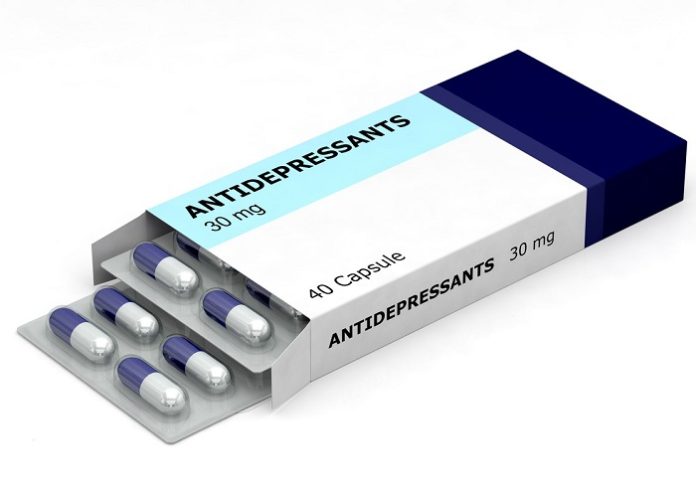A major review of the potential side effects of certain anti-depressants has found that some people can gain as much as 2kg in weight within the first two months of treatment, while others can lose the equivalent or more on other types, reports The Guardian.
The researchers, led by King’s College London and the University of Oxford, are now calling for anti-depressant treatment guidelines to be updated to reflect their findings, which showed that while some of the medications can cause notable changes in body weight, heart rate and blood pressure, others do not cause such physical changes.
The study involved analysis of data from 151 clinical studies on the drugs, comparing the physical health effects of 30 different anti-depressants in more than 58 000 people.
Notable variation in side effects between different medications were found, despite most of the studies analysed involving only eight weeks of anti-depressant use.
For example, there was a difference of up to 4kg in average weight change between some drugs: equivalent to about 2.5kg of weight loss on agomelatine, compared with about 2kg of weight gain with maprotiline.
Weight gain occurred in nearly half of the people prescribed drugs like maprotiline or amitriptyline, whereas more than half of those taking agomelatine experienced weight loss.
The study – published in The Lancet – also found a 21-beat-a-minute difference in heart rate between people taking fluvoxamine and nortriptyline. An 11 mmHg difference in blood pressure was found between nortriptyline and doxepin.
Dr Toby Pillinger, a clinical lecturer at KCL, said: “Anti-depressants are among the most widely used medicines in the world. While many people benefit from them, these drugs are not identical – some can lead to meaningful changes in weight, heart rate and blood pressure in a relatively short period.
“Our findings show that SSRIs (selective serotonin reuptake inhibitors), which are the most prescribed type, tend to have fewer physical side effects, which is reassuring. But for others, closer physical health monitoring may be warranted. The aim isn’t to deter use but to empower patients and clinicians to make informed choices and to encourage personalised care.”
Andrea Cipriani, a Professor of Psychiatry at the University of Oxford, said: “Our results emphasise the importance of shared decision-making, the collaborative process through which patients are supported by the clinicians to reach a decision about their treatment, bringing together their preferences, personal circumstances, goals, values, and beliefs. This should be the way forward in the NHS and globally.”
Study details
The effects of antidepressants on cardiometabolic and other physiological parameters: a systematic review and network meta-analysis
Toby Pillinger, Atheeshaan Arumuham, Robert McCutcheon et al.
Published in The Lancet on 21 October 2025
Summary
Background
Antidepressants induce physiological alterations; however, the degree to which these occur in treatment with various antidepressants is unclear. We aimed to compare and rank antidepressants based on physiological side-effects by synthesising data from randomised controlled trials (RCTs).
Methods
We searched MEDLINE, EMBASE, PsycINFO, ClinicalTrials.gov, and the US Food and Drug Administration (FDA) website from database inception to April 21, 2025. We included single-blinded and double-blinded RCTs comparing antidepressants and placebo in acute monotherapy of any psychiatric disorder. We did frequentist random-effects network meta-analyses to investigate treatment-induced changes in weight; total cholesterol; glucose; heart rate; systolic and diastolic blood pressure; corrected QT interval (QTc); sodium; potassium; aspartate transferase (AST); alanine transaminase (ALT); alkaline phosphatase (ALP); bilirubin; urea; and creatinine. We did meta-regressions to examine study-level associations between physiological change and age, sex, and baseline weight. We estimated the correlation between depressive symptom severity change and metabolic parameter change.
Findings
Of 26 252 citations, 151 studies and 17 FDA reports met inclusion criteria. The overall sample included 58 534 participants, comparing 30 antidepressants with placebo. Median treatment duration was 8 weeks (IQR 6·0–8·5). We observed clinically significant differences between antidepressants in terms of metabolic and haemodynamic effects, including an approximate 4 kg difference in weight-change between agomelatine and maprotiline, over 21 beats-per-minute difference in heart rate change between fluvoxamine and nortriptyline, and over 11 mmHg difference in systolic blood pressure between nortriptyline and doxepin. Paroxetine, duloxetine, desvenlafaxine, and venlafaxine were associated with increases in total cholesterol and, for duloxetine, glucose concentrations, despite all drugs reducing bodyweight. There was strong evidence of duloxetine, desvenlafaxine, and levomilnacipran increasing AST, ALT, and ALP concentrations, although the magnitudes of these alterations were not considered clinically significant. We did not find strong evidence of any antidepressant affecting QTc, or concentrations of sodium, potassium, urea, and creatinine to a clinically significant extent. Higher baseline bodyweight was associated with larger antidepressant-induced increases in systolic blood pressure, ALT, and AST, and higher baseline age was associated with larger antidepressant-induced increases in glucose. We did not observe an association between changes in depressive symptoms and metabolic disturbance.
Interpretation
We found strong evidence that antidepressants differ markedly in their physiological effects, particularly for cardiometabolic parameters. Treatment guidelines should be updated to reflect differences in physiological risk, but choice of antidepressant should be made on an individual basis, considering clinical presentation and preferences of patients, carers, and clinicians.
See more from MedicalBrief archives:
Anti-depressants not linked to better quality of life, over time – Saudi study
In the long run, drugs and talk therapy hold same value for depression patients
Move to quit psychiatric medication gains momentum
Self-harm risk high immediately after starting anti-depressants – US analysis
Global depression guidelines lack withdrawal advice – Danish review

